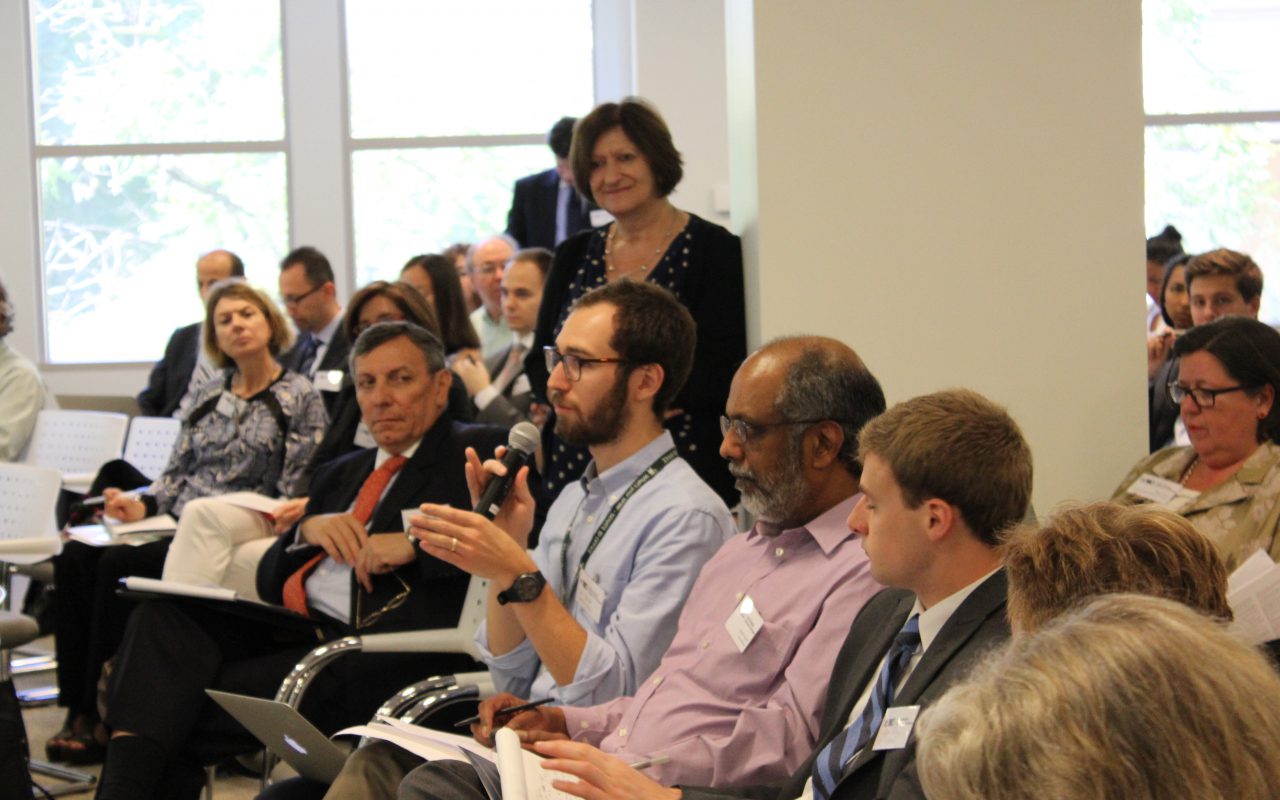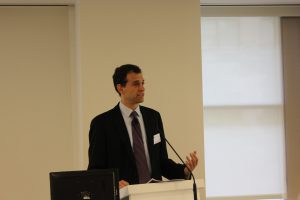The TACD Stakeholder Forum ‘The TTIP one year on: Consumers Mean Business’ took place on Tuesday, 24 June 2014 in the Pew Conference Center, Washington D.C.
Consumer advocates, EU and U.S. government officials and business people discussed the implications of the proposed Transatlantic Trade and Investment Partnership (TTIP) for citizens and consumers. The conference hosted three plenary and multiple breakout sessions.
Introductory keynote speeches
U.S. TACD Steering Committee Co-Chair Ed Mierzwinski moderated three keynote speeches to open the conference:
Julieta Valls Noyes, U.S. Deputy Assistant Secretary of State for the Bureau of European and Eurasian Affairs (standing in for Ambassador David Throne who was called away on official business), opened with a welcome to participants on behalf of the State Department and a strong defence of the TTIP’s potential benefit to consumers.
Deputy Director General Ladislav Miko from the European Commission’s Directorate-General for Consumer Protection and Health (SANCO) also highlighted a number of potential gains for consumers, including wider choice, lower prices and increased access to the latest medical treatments as well as, indirectly, savings and efficiency gains because regulators would be able to share tasks and therefore improve performance.
Mr Miko also repeated claims that the European Commission will not change EU policy on certain issues such as hormones or the authorisation of GMOs; “Food safety standards are not up for negotiation”. According to Miko, the TTIP will also not undermine the precautionary principle, which is enshrined in the Lisbon Treaty and is a basic principle of EU food law.
TTIP will also not undermine the precautionary principle, which is enshrined in the Lisbon Treaty and is a basic principle of EU food law.
Robert Adler, Acting Chairman of the U. S. Consumer Product Safety Commission (CPSC), said that in some instances, general product safety approaches in the EU and U.S. do not match. In the U.S., for instance, children’s products have stringent limits on lead and need to be tested by independent laboratories before being put on the market.
According to Adler, differences in regulation are much more an annoyance to industry than a financial cost. Prudent firms, he said, simply comply with the most stringent regulation to ensure compliance with all. The CPSC would not be the prime mover in addressing differences between standards, he said. It is up to businesses to identify specific standards that they believe are not necessary.
Plenary session: Do we need Investor to State Dispute Settlement in TTIP?
The controversial Investor State Dispute Settlement (ISDS) mechanism was the focus of the first plenary session. Keynote speakers Ignacio Garcia Bercero, the Chief TTIP Negotiator for the EU, and Robert Weissman, President of Public Citizen in the U.S., articulated two opposing views as to the necessity of including an ISDS clause in the TTIP.
A heated debate followed with additional panellists Dan Mullaney, the U.S. Chief TTIP Negotiator for the Office of the U.S. Trade Representative (USTR), Celeste Drake, Trade and Globalisation Specialist (AFL-CIO, the US federation of labour organisations) and Jonathan Stoel from the Transatlantic Business Council. Susan Grant, Director of Consumer Protection at Consumer Federation of America, moderated the discussion.
Robert Weissman pointed out that efforts to reform ISDS revealed deep flaws and showed that “if a system requires so many patches to be fixed we should not continue trying to improve it but step back and reconsider the whole thing”. He concluded that those who think they can fix the system underestimate the ability of corporate lawyers to take advantage of exceptions. He cautioned against “alleviating corporate rights over citizens’ rights”.
Celeste Drake pointed out that ISDS reduces governments’ ability to be responsive to their citizens. She also added that we should not be deceived into believing that its extra-judicial decision-making panels can be controlled.
US Chief Negotiator Dan Mullaney, on the other hand, said that ISDS was needed and that 21st century trade agreements require global rules for investment.
Some of the key problems with ISDS brought up in discussion were:
The number of cases has exploded in the last decade. The TTIP will lead to further increases because of the scale of cross-Atlantic investment.
ISDS is not needed in TTIP as investors are sufficiently protected in the EU and in the U.S. via advanced judicial systems on both sides.
ISDS could lead to the lowering of standards in national legislation due to the ‘chilling effect’, as governments might refrain from legislating on consumer, public health or environmental protection for fear of being facing expensive challenges from large, powerful multinationals.
The ISDS mechanism discriminates against national companies and consumers as it can only be used by foreign companies.
Plenary session: Regulatory coherence & regulatory cooperation
Among the biggest obstacles to forming a transatlantic single market are the ‘non-tariff barriers to trade’ that are erected by regulations and standards that businesses must conform to in order to sell their products and services in each of the two markets. The aim of regulatory coherence and cooperation is to remove these ‘barriers’, a process that has led to serious concerns among civil society about compromising existing levels of consumer protection.
The keynote speakers on this panel were Dan Mullaney, Chief TTIP Negotiator, Office of the U.S. Trade Representative (USTR) and Monique Goyens, Director General, BEUC and EU Co-Chair of TACD.
Dan Mullaney pointed out that the reduction of unnecessary differences between regulatory systems could lead to a reduction of costs. “To give regulators the possibility to communicate with each other and share information allows them to make better legislation to the benefit of citizens and consumers.”
 Monique Goyens responded that regulatory cooperation is a new concept in the area of trade policy which goes far beyond the portfolio of trade negotiators. “Regulatory cooperation is about broader decision-making issues.” Ms Goyens also raised questions about the mandate of the planned Regulatory Cooperation Council, and which stakeholders would be part of it.
Monique Goyens responded that regulatory cooperation is a new concept in the area of trade policy which goes far beyond the portfolio of trade negotiators. “Regulatory cooperation is about broader decision-making issues.” Ms Goyens also raised questions about the mandate of the planned Regulatory Cooperation Council, and which stakeholders would be part of it.
A lively discussion followed between panellists Ladislav Miko, Deputy Director-General of DG SANCO, Alex Hunt, Branch Chief at the U.S. Office of Management and Budget, Diplomat and Minister-Counselor at the EU Delegation to the U.S., and Courtenay Lewis, Trade Representative at the Sierra Club.
Concluding plenary: Will the TTIP bring any benefits for consumers?’
Moderated by Benedicte Federspiel from the Danish Consumer Council, the final discussion of the conference focused on whether consumers could benefit from a potential transatlantic trade deal. Here are a selection of the concerns raised:
Food: Henry Uitslag of Dutch consumer organisation Consumentenbond said that while regulators promise that they are getting the best out of the negotiations, the fact that few details are revealed does not provide sufficient confidence that TTIP will not result in a regulatory ‘race to the bottom.’ He illustrated this point with the example of transfats, which are banned in Denmark and require labelling in the U.S. Depending on the outcome of negotiations, the TTIP could lead either to a comprehensive ban on transfats in the EU and the U.S., or an obligation for Denmark to reverse its ban.
Financial services: Isabelle Buscke from VZBV, the German federation of consumer organisations, highlighted that EU and U.S. consumer groups are very wary of the inclusion of financial services in the TTIP. While cooperation between regulators makes sense – for instance as an objective to ensure financial stability – there are doubts that a trade agreement with a focus on market deregulation and liberalization is the right tool for this.
Data protection: Jeff Chester from the Center for Digital Democracy expressed the concern that business want to undermine EU’s data protection system and that civil society will be very alert as to any attempts to erode human rights protections.
Chemicals: Sylvia Maurer, BEUC, said that it is wrong to assume that divergence in regulation would stifle innovation. In fact the contrary is true, she said, citing the example of France leading on the development of a nano-register which  is not something being considered at EU level.
is not something being considered at EU level.
Intellectual Property: Knowledge Ecology International’s James Love said that the TTIP might result in making it harder to change the way medical innovation is financed and said that civil society is concerned about the enforcement of IP infringements by private justice systems.
What next?
The TACD Chairs, in their concluding remarks, voiced appreciation of the exchange of views with government officials and stakeholders. However, they also underlined the importance that negotiators start to engage into meaningful dialogue with civil society on the scope and content of the detailed provisions of the TTIP, on the basis of a publicly available text.

